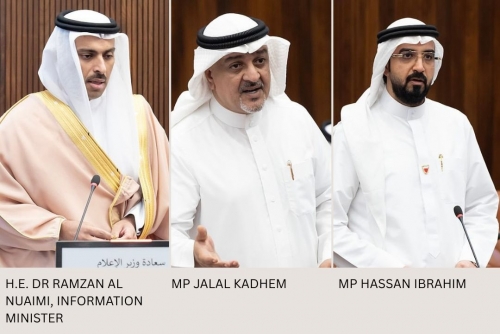MPs pass Press Law reform, drop jail sentences, and introduce licensing requirements for online media
TDT | Manama
Email: mail@newsofbahrain.com
MPs yesterday voted to scrap prison terms for publishing offences and bring Bahrain’s online media under formal regulation, passing sweeping changes to the Press Law that also introduce licensing requirements for digital platforms.
“Get a job, sir, instead of sitting in a cafe stirring unrest,” said MP Jalal Kadhem during the debate.
He criticised those who rely on social media for income while spreading rumours or recycling the work of newspapers.
His remark echoed a wider frustration in the chamber with unlicensed online outlets.
The revised law, now titled the Press, Printing and Electronic Media Law, updates Decree-Law No. 47 of 2002.
The final vote followed a tense session. Seventeen MPs, including the Speaker, backed the bill and nine voted against.
Licensing regime
The law brings digital publishers, online news sites and content platforms under a formal licensing regime.
Those already operating will have six months to register. Anyone continuing without a licence may face a fine of up to BD10,000.
Foreign correspondents will also be required to obtain permission to operate in the country. The mechanism for that will be set by royal decree.
Suspension
Courts will now be able to suspend newspapers or block websites at the investigation stage if the content is seen to threaten national security or public order.
Media outlets, online or in print, must also publish official announcements related to sovereignty, defence, security or health, provided they are received in time for release.
Another article allows the ministry, in coordination with the Ministry of Foreign Affairs, to direct outlets not to publish certain material issued by foreign governments. Breaches may lead to fines.
A clause that would have allowed the Minister of Information to license media and advertising activity not covered by current laws was struck out during the session.
Concerns
Several MPs raised concerns over its scope and lack of oversight.
Information Minister, His Excellency Dr Ramzan Al Nuaimi, said the law was aimed only at professional media, not at individual users of social platforms.
“The law is for proper media, not for people posting on their personal pages,” he told the chamber.
He said the sole concern raised by digital media workers had been addressed in the final version and confirmed that any page engaged in media or advertising work would be formally licensed.
Dr Al Nuaimi added that many are already covered by advertising laws.
Clause
The Minister also said that a clause requiring media owners to hold full political rights had been dropped.
Licence revocations, he said, would generally require a court ruling, except in a handful of specific cases detailed in the law.
Kadhem, who submitted over a dozen suggested revisions, said the measure was intended to bring the law in line with how media now operates.
“This is not a new law, it is a revision of what is already there,” he said. “We went through the proposals in full, and changes were made after discussions with account holders and others.”
Comparisons
He rejected comparisons between social media and institutional journalism.
“If someone claims social media is a source of income, they should find work like everyone else,” he said. “We are not in a jungle. We live in a country of laws. The state regulates print and broadcast media, so why not digital?”
“There is a difference between using a platform to inform and using it to inflame or pull foreign quarrels into the country,” he added.
MP Hassan Ibrahim also welcomed the law.
He said it marked a move away from criminal punishment for publishing disputes.
“We have removed the word “discipline” and replaced it with “accountability”. It is not just language, it is the principle behind it,” he said.
Pre-trial detention
He supported the scrapping of pre-trial detention in press cases and called for a clear distinction between licensed journalists and unregulated social media activity.
Related Posts

